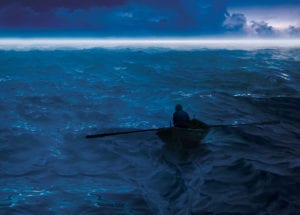By Daniel de la Callehttp://www.danieldelacalle.com/
Gone is 2012, the hottest or coldest year in recent history depending on where you live, gone too are the days of Ocean Acidification information famine. You can now watch videos deciphering the oceans, listen to songs about acidity, follow via tweets a research expedition to Antarctica, attend a seminar near you or listen to senatorial speeches on the threat poised by CO2 on life in this planet to name but a few. Enjoy… hmm, you know what we mean:
≈≈≈≈“Ocean Acidification: See Through My Eyes”, by the Ocean Ark Alliance.
≈≈≈≈“Acidifying Waters Corrode Northwest Shellfish”, a PBS News Hour piece published last December.
≈≈≈≈“Ocean Acidfication”, by the RU Center for Digital Filmmaking.
≈≈≈≈“Ocean Acidification: Can Corals Cope?”, a video from UCSD-TV from the Perspectives on Ocean Science series (check out the list with over 50 videos), to “hear Scripps marine biologist Martin Tresguerres describe research into the potential impact of ocean acidification on corals, and the mechanisms these amazing marine animals use to try to cope with the problem.”
SOURCE
≈≈≈≈“Ocean Acidification”, a song.
≈≈≈≈“An expedition to the icy waters of Antarctica has begun aboard the RRS James Clark Ross. The five-week mission will study the effect of ocean acidification in the Southern Ocean. The scientists will be contributing to a blog www.antarcticoacruise.org.uk
During the expedition, scientists will study the impact of the changing chemistry on marine organisms and ecosystems, on the cycling of carbon and nutrients in the sea and on how the sea interacts with the atmosphere to influence climate. This study is part of the UK Ocean Acidification research program UKOA. www.oceanacidification.org.uk/
Dr Geraint Tarling, from the British Antarctic Survey is leading the team of thirty scientists. He said: “This is the most comprehensive investigation into the response of the Southern Ocean ecosystem to ocean acidification yet mounted. The team will not only look at how different parts of the ecosystem respond in isolation but also see how effects interact to produce an ecosystem-level response.””
SOURCE
MORE INFO
≈≈≈≈An interesting article on Scientific American (originally published at The Daily Climate titled “US Effort on Ocean Acidification Needs Focus on Human Impacts”.
“A federal plan to tackle ocean acidification must focus more on how the changes will affect people and the economy, according to a review of the effort by a panel of the National Research Council.
“Social issues clearly can’t drive everything but when it’s possible they should,” said George Somero, chair of the committee that wrote the report and associate director at Stanford University’s Hopkins Marine Station. “If you’re setting up a monitoring station, it should be where there’s a shellfish industry, for example.”“
SOURCE
≈≈≈≈The 2013 Alaska Marine Science Symposium is taking place on January 21-24 in Anchorage. Federal fisheries scientists speaking out on king salmon and Ocean Acidification issues will be among the keynote speakers. The event is free and you can register HERE
MORE INFO
≈≈≈≈For those living in Washington State on January 24th (6-8PM) there will also be a free seminar at the Everett Station on Ocean Acidification. The event is hosted by the Snohomish County Marine Resources Committee.
“Terrie Klinger, University of Washington School of Marine & Environmental Affairs ecologist will present “What is Ocean Acidification?” Shallin Busch, National Oceanic and Atmospheric Administration research ecologist, will present “Food Web Implications of Ocean Acidification.” Brad Warren, Sustainable Fisheries Partnership and National Fisheries Conservation Center Director of Global Ocean Health, will present “Recommendations, Partnerships and Actions.”“
SOURCE
≈≈≈≈A couple work and study opportunities:
1 Post-

